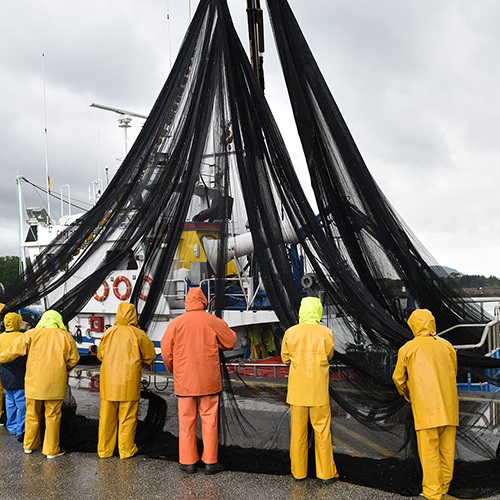Is the whole fishery suspended?
Yes. The two stocks, NSAS and WBSS herring, are both included in the same Unit of Certification, reflecting that the fishery operates in areas where the two stocks mix.
Are other fisheries affected?
Yes. The Western Baltic spring spawning herring fishery is also affected. Client: Erzeugergemeinschaft der Hochsee – und Kutterfischer GmbH (Germany). CAB: Acoura. This fishery went through a regular Surveillance Audit on 25th July 2018.
What does suspension mean?
Suspension means that herring from the DFPO, DPPO and SPFPO Skagerrak, Kattegat and Western Baltic Herring Fishery caught after the 21st of September 2018 cannot be sold with the MSC ecolabel. Fish caught prior to the date of suspension may continue to be sold after the date of suspension as MSC-certified if the CAB confirms the client’s ability to segregate fish based on date of capture.
Will the fishery stop?
No. Fishing will continue as usual, but the catch cannot be sold as MSC-certified. The herring fishery in the Western Baltic (areas 22-24) is primarily a winter fishery (November-February). The herring fishery in the Skagerrak (Area 3a) goes on throughout the year with most of the activity in the late autumn.
What does self- suspension mean?
A self-suspension is a voluntary decision by the client to suspend their MSC fishery certificate. A self-suspended fishery cannot make any claims of MSC certification.
How is self-suspension different to the certifier suspending the fishery?
As per MSC requirements, a fishery can voluntarily ask its CAB to enter a period of self-suspension. Different reasons can justify this choice: financial, administrative etc…In the case of the DFPO, DPPO and SPFPO Skagerrak, Kattegat and Western Baltic Herring fishery, the fishery clients were aware of ICES’ revised perception of the stock and understood their fishery was no longer meeting the MSC requirements. Therefore, to avoid an unnecessary expedited audit, they notified their certifier MRAG Americas of their decision to self-suspend the fishery.
How is self-suspension different to withdrawal from the program?
A self-suspension means that the fishery technically remains engaged in the MSC program. The certificate can be reinstated within the initial five-year certification period. A certificate withdrawal means the fishery exits the MSC program. To re-enter the program a withdrawn fishery must undergo a new, complete reassessment. In all cases - suspension, self-suspension and withdrawal - the fishery cannot make any claims of MSC certification.
Why is the fishery suspended?
The latest scientific advice from ICES for the Western Baltic spring spawning (WBSS) herring stock (ICES advice) concluded that this stock is not in good condition; the biomass is below the reference point Blim, which indicates that recruitment is impaired. The new scientific information implies that fisheries targeting this herring stock no longer meet the requirements of the MSC fishery standard. It is the certifier (CAB) who assesses whether the fishery still meets the requirements for certification; however, the fishery can also opt for self-suspension, and that is what the clients DPPO, DFPO and SPFPO have decided to opt for.
Why has the Western Baltic spring spawning (WBSS) herring stock declined?
The biomass of the WBSS herring stock has actually increased since 2011. The reasons for the changed scientific perception of the stock´s status are technical changes in the assessment and revised reference points. During the most recent benchmarking of the WBSS herring stock in 2018, a new statistical model was used. New survey indices were added in order to improve knowledge on the recruitment and distribution of young herring. These changes resulted in a downward revision of the historic perception of the stock´s health. The biomass limit reference point (Blim) - the point below which a stock´s health is considered to be critical – was raised by ICES from 90,000 t to 120,000 t. As a consequence, the stock size is now below Blim and has been below Blim since 2007.
Does the fishery have to implement a corrective action plan?
In the case of self-suspension, no corrective action plan is required from the fishery client.
Why is there not a 30 days-notice period between the announcement and the effective date of the suspension?
The two CABs involved; MRAG Americas and Acoura, are harmonizing the announcement of suspension for the two fisheries. They are both using General Certification Requirements v. 2.1., in which the 30-day notification period in not included.
Which alternative sources are there for MSC certified herring?
There are many certified fisheries for herring in the North Sea, Baltic Sea and the Northeast Atlantic:
North Sea:
SPFPO Swedish North Sea herring
DPPO and DFPO North Sea herring
Norway North Sea and Skagerrak herring
Northern Ireland Pelagic Sustainability Group(NIPSG) Irish Sea-Atlantic mackerel & North Sea herring
FROM Nord North Sea and Eastern Channel pelagic trawl herring
Baltic Sea:
Finland Baltic herring & sprat
Northeast Atlantic:
SPSG, DPPO, PFA, SPFPO & KFO Atlanto-Scandian purse seine and pelagic trawl herring
ISF Norwegian & Icelandic herring trawl and seine
Faroese Pelagic Organisation Atlanto-Scandian herring
Norway spring spawning herring
Northern Ireland Pelagic Sustainability Group (NIPSG) Irish Sea herring
Links and resources:
About the fishery on the MSC Track a Fishery website: DFPO, DPPO and SPFPO Skagerrak, Kattegat and Western Baltic Herring Fishery
ICES advice for Western Baltic spawning herring: Herring (Clupea harengus) in subdivisions 20–24, spring spawners (Skagerrak, Kattegat, and western Baltic) 31 May 2018.
Contacts:
SCANDINAVIA AND BALTIC REGION
COMMUNICATION LEAD:
Majken Møller, Communications and marketing manager, Denmark
[email protected] tel + 45 53 555 008
Linda Sörnäs, PR and Marketing Manager, Sweden
[email protected] mobile: +46(0)738022503, office: +46(0)8 503 872 40
FISHERIES OUTREACH LEAD
Kari Stange, Senior Stakeholder Engagement Manager, Scandinavia and Baltic Sea Region, [email protected] tel +46 76 777 7512 (Fisheries outreach Lead)
Other:
Minna Epps, Program Director, Scandinavia and Baltic Sea Region,
[email protected] tel +46 730 385897
Ellen Bruno, Senior Commercial Manager, Scandinavia and Baltic Sea Region [email protected] tel +46 767 869512


